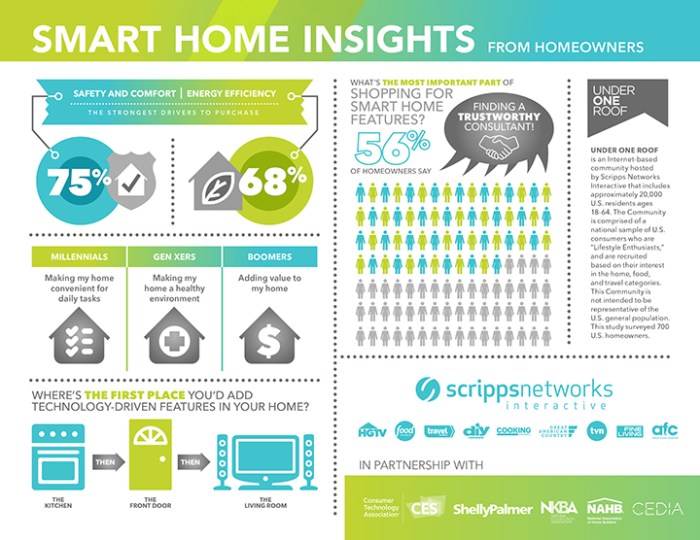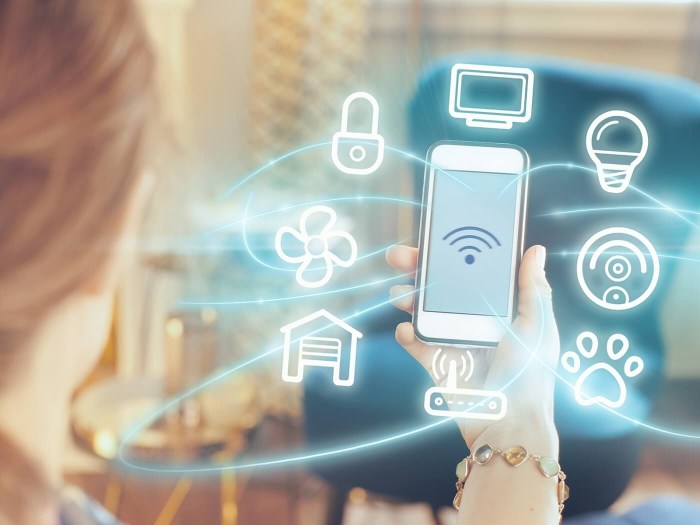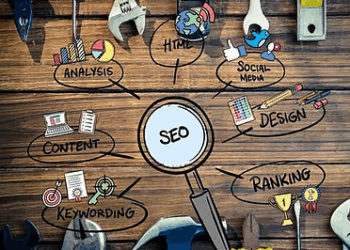
Beginning with How Smart Home Technology Affects Property Value Globally, the narrative unfolds in a compelling and distinctive manner, drawing readers into a story that promises to be both engaging and uniquely memorable.
Smart home technology has revolutionized the way we interact with our living spaces, offering a seamless blend of convenience, efficiency, and security. As this technology becomes more prevalent, its impact on property values worldwide is a topic of increasing interest and importance.
Overview of Smart Home Technology

Smart home technology refers to the integration of various devices and systems within a home to automate and enhance the overall living experience. These devices are connected to a central network that allows homeowners to control and monitor them remotely using their smartphones or other smart devices.
Key Components of a Smart Home System
- Smart Thermostats: These devices can regulate the temperature of a home based on the occupants’ preferences and schedules, leading to energy savings and increased comfort.
- Smart Lighting: Lighting systems that can be controlled remotely or set to operate on a schedule, improving energy efficiency and security.
- Smart Security Systems: Includes features such as smart locks, security cameras, and motion sensors that enhance the safety and security of the property.
- Voice Assistants: Devices like Amazon’s Alexa or Google Assistant enable homeowners to control various smart devices using voice commands.
- Smart Appliances: Appliances like refrigerators, ovens, and washing machines that can be controlled remotely and provide efficiency and convenience.
Benefits of Integrating Smart Home Technology into Properties
- Increased Property Value: Homes with smart technology features are perceived as more modern, convenient, and energy-efficient, leading to higher property values.
- Energy Efficiency: Smart devices can help homeowners save on energy bills by optimizing energy usage based on preferences and schedules.
- Convenience: The ability to control and monitor various aspects of a home remotely provides convenience and peace of mind to homeowners.
- Enhanced Security: Smart security systems offer advanced features like real-time monitoring, alerts, and remote access, increasing the overall security of the property.
- Customization: Smart home technology allows homeowners to personalize their living spaces according to their preferences and lifestyle, creating a more comfortable environment.
Impact of Smart Home Technology on Property Value
Smart home technology has a significant impact on property value, with homes equipped with these features often commanding higher prices than those without. The convenience, security, and energy efficiency offered by smart home devices can greatly enhance a property’s appeal and desirability in the real estate market.
Examples of How Smart Home Technology Can Increase Property Value:
- Installation of smart thermostats can lead to energy savings of up to 12% on heating and 15% on cooling, making homes more cost-effective to run and attractive to potential buyers.
- Smart security systems with cameras, sensors, and remote monitoring capabilities provide homeowners with peace of mind and can lead to lower insurance premiums, adding value to the property.
- Integration of smart lighting and blinds that can be controlled remotely or through voice commands can enhance the ambiance of a home and improve its overall appeal.
Potential Cost Savings Associated with Smart Home Features:
- Smart home technology can result in significant cost savings over time through improved energy efficiency, reduced maintenance costs, and enhanced security measures.
- Automated systems can optimize energy usage, leading to lower utility bills and a smaller carbon footprint, which can be attractive selling points for eco-conscious buyers.
- Remote monitoring capabilities allow homeowners to detect issues early and prevent costly repairs, ultimately preserving the property’s value in the long run.
Comparison of Property Value of Homes with and Without Smart Technology:
- Homes equipped with smart home technology typically sell for higher prices compared to similar properties without these features, showcasing the added value that these advancements bring to a property.
- A study by the National Association of Home Builders found that buyers are willing to pay more for homes with smart technology, indicating a growing demand for these innovative solutions in the real estate market.
- Properties with smart home features also tend to spend less time on the market, indicating that buyers recognize and appreciate the benefits of a technologically advanced home.
Global Trends in Smart Home Technology Adoption
Smart home technology adoption has been steadily increasing worldwide as more homeowners seek to enhance their living spaces with innovative tech solutions. This trend is driven by the growing availability of smart devices, improved connectivity, and the desire for convenience and efficiency in daily life.
Regions with High Smart Home Technology Adoption
- In North America, countries like the United States and Canada have seen significant adoption of smart home technology. This can be attributed to the tech-savvy population, high disposable income, and the presence of major tech companies offering smart home solutions.
- Europe has also embraced smart home technology, with countries like the United Kingdom, Germany, and France leading the way. The emphasis on energy efficiency, security, and sustainability has driven the adoption of smart devices in European homes.
- In Asia, countries such as Japan, South Korea, and China have rapidly adopted smart home technology. The focus on technological innovation, urbanization, and the rise of smart cities has contributed to the widespread adoption of smart devices in Asian households.
Cultural Factors Influencing Smart Home Technology Adoption
- Cultural attitudes towards technology play a significant role in the adoption of smart home devices. In countries where technology is deeply integrated into daily life, such as the United States and South Korea, the acceptance of smart home technology is higher.
- Privacy concerns and data security also impact the adoption of smart home devices. Countries with stricter data protection regulations, like those in Europe, may see slower adoption rates due to concerns about privacy breaches.
- The availability of infrastructure and internet connectivity can also influence the adoption of smart home technology. Regions with reliable internet access and advanced infrastructure are more likely to embrace smart devices in their homes.
Design and Integration Considerations

When it comes to designing a smart home system and integrating smart technology into properties, there are several key factors to consider. Ensuring a seamless integration and future-proofing your smart home design are crucial for maximizing property value in the long run.
Factors to Consider When Designing a Smart Home System
- Assess the specific needs and lifestyle of the homeowners to tailor the smart home system accordingly.
- Consider the compatibility of different smart devices and technologies to ensure they work together seamlessly.
- Think about the scalability of the system to accommodate future upgrades and expansions.
- Plan the layout and placement of smart devices strategically to optimize functionality and convenience.
Seamless Integration of Smart Technology into Different Types of Properties
- Customize the smart home system to suit the unique features and architecture of the property.
- Work with professionals who specialize in smart home integration to ensure a smooth and efficient installation process.
- Consider the aesthetic appeal of smart devices and incorporate them seamlessly into the design of the property.
- Provide training and support for homeowners to help them understand and make the most of their smart home technology.
Importance of Scalability and Future-Proofing in Smart Home Design
- Invest in a flexible and adaptable smart home system that can evolve with advancing technology.
- Choose devices and technologies with regular updates and support to ensure long-term functionality.
- Consider the resale value of the property and how a future buyer may perceive the smart home system.
- Stay informed about the latest trends and innovations in smart home technology to keep the property up-to-date and attractive to potential buyers.
Security and Privacy Concerns
Smart home technology offers convenience and efficiency, but it also raises concerns about security and privacy. As more devices are connected to the internet, the risk of cyber attacks and data breaches increases. It is essential to address these issues to ensure the safety and protection of smart home users.
Common Security Risks
- Weak or default passwords: Many smart devices come with default passwords that are easy to guess. It is crucial to change these passwords to strong, unique ones to prevent unauthorized access.
- Unsecured connections: Insecure Wi-Fi networks can make smart home systems vulnerable to hacking. Encrypting the network and using a strong password can help secure the connection.
- Outdated software: Failure to update smart devices and systems can leave them susceptible to known vulnerabilities. Regularly updating firmware and software is essential to patch security flaws.
Enhancing Security Measures
- Implementing two-factor authentication: Adding an extra layer of security, such as biometric authentication or one-time codes, can help prevent unauthorized access to smart home devices.
- Network segmentation: Creating separate networks for smart devices and personal computers can isolate potential threats and minimize the impact of a breach.
- Monitoring and alerts: Setting up alerts for unusual activity on smart home systems can help detect security incidents early and take action to prevent further damage.
Importance of Privacy Protection
Protecting privacy in smart homes is crucial to safeguard personal data and prevent unauthorized surveillance. With the amount of information collected by smart devices, users must take steps to ensure their privacy is respected and maintained. Measures such as reviewing privacy policies, disabling unnecessary data collection features, and securing network connections can help protect sensitive information from being compromised.
Summary
In conclusion, the integration of smart home technology into properties not only enhances the living experience but also adds tangible value to real estate investments globally. As we continue to embrace these innovations, it’s clear that the intersection of technology and property value will shape the future of real estate markets around the world.
Q&A
How can smart home technology increase property value?
Smart home technology can increase property value by offering greater convenience, energy savings, and enhanced security features that appeal to buyers looking for modern amenities.
Are there specific regions where smart home technology is more popular?
Regions like North America, Europe, and parts of Asia have shown higher adoption rates of smart home technology due to factors like technological infrastructure and consumer demand.
What are some common security risks associated with smart home technology?
Common security risks include hacking vulnerabilities, data breaches, and privacy concerns related to the collection of personal information by smart devices.













